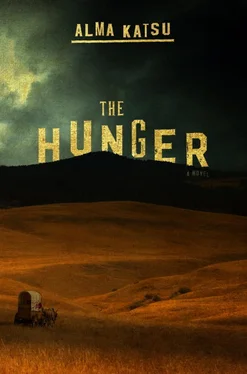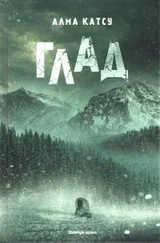Алма Катсу - The Hunger
Здесь есть возможность читать онлайн «Алма Катсу - The Hunger» весь текст электронной книги совершенно бесплатно (целиком полную версию без сокращений). В некоторых случаях можно слушать аудио, скачать через торрент в формате fb2 и присутствует краткое содержание. Город: New York, Год выпуска: 2018, ISBN: 2018, Издательство: G. P. Putnam's Sons, Жанр: Ужасы и Мистика, Историческая проза, на английском языке. Описание произведения, (предисловие) а так же отзывы посетителей доступны на портале библиотеки ЛибКат.
- Название:The Hunger
- Автор:
- Издательство:G. P. Putnam's Sons
- Жанр:
- Год:2018
- Город:New York
- ISBN:978-0-735-21251-0
- Рейтинг книги:4 / 5. Голосов: 1
-
Избранное:Добавить в избранное
- Отзывы:
-
Ваша оценка:
- 80
- 1
- 2
- 3
- 4
- 5
The Hunger: краткое содержание, описание и аннотация
Предлагаем к чтению аннотацию, описание, краткое содержание или предисловие (зависит от того, что написал сам автор книги «The Hunger»). Если вы не нашли необходимую информацию о книге — напишите в комментариях, мы постараемся отыскать её.
The Hunger — читать онлайн бесплатно полную книгу (весь текст) целиком
Ниже представлен текст книги, разбитый по страницам. Система сохранения места последней прочитанной страницы, позволяет с удобством читать онлайн бесплатно книгу «The Hunger», без необходимости каждый раз заново искать на чём Вы остановились. Поставьте закладку, и сможете в любой момент перейти на страницу, на которой закончили чтение.
Интервал:
Закладка:
“No,” she said now. “I do not take what I want. I am not like you at all. Everything—everything I have ever done has been for others. Has been so my children can be safe. And I’ll prove it to you.”
“What are you saying?” Keseberg asked.
“I’m going to help you,” she said.
SHE REMAINED IN HIS CABIN. If she left, if she saw her daughters one last time, she knew she might lose her resolve. That it might break her. So she made him promise never to tell them that he had seen her. Never to speak of what happened next.
That night, after Keseberg had got the fires going, Tamsen mixed together the last of her sleeping herbs—lavender, chamomile, mint, and a few final drops of laudanum. She stirred them into melted ice from the lake’s surface and drank them down, waiting for the sleep to come.
As she began to drift off, Keseberg approached her. “I’ll wait until you’re asleep, like I promised,” he said, and she knew he would keep his word.
“You’ll make sure,” she repeated again anyway. “You’ll make sure it’ll go to them first. You’ll make sure it’ll go to the girls,” she said.
He nodded.
He settled across from her on the floor, waiting, cradling the ax in his arms.
Her eyes fluttered closed and open, closed and open. The cabin was gone. She saw instead those wheat fields outside her brother’s window. The sweep of late summer sky bending low and wide and blue over the swaying grain—waves and waves of it. A whole sea made of gold. She heard children laughing. She sensed the flicker of a feeling she hadn’t known since her own childhood. And at last, she slept.
EPILOGUE

James Reed was halfway across the ridgeline when the big bay gelding buckled suddenly underneath him, floundering in the deep snow. For a moment, Reed was afraid they would both go down.
The footing had been treacherous every inch of the way from John Sutter’s fort. If it wasn’t heavy wet snow, it was slippery mud higher than the horses’ fetlocks. A wet, miserable time of year. But there was no choice. Putting off the rescue operation until it got warmer was out of the question. He was afraid he’d already waited too long.
Reed urged his reluctant horse on. A string of men on horseback and supply mules snaked behind him.
Seven days out from Sutter’s, the snow was now chest-deep on the horses. It was clear they could go no farther on horseback; they’d be better off traveling on foot. This meant they could take far fewer of the precious supplies he’d worked so hard to gather, which troubled Reed but couldn’t be helped. The rest they strung up in the trees to use for resupply on their return. The bundles, swaying high in the branches, looked like misshapen insects’ nests. In that moment, he made himself a promise: When they came back this way, his family would be with him. Margaret, Virginia, Patty, little James, Thomas.
It was the promise of this reunion that had kept him going through his hard months of exile. He wouldn’t have lasted a week if his stepdaughter Virginia hadn’t snuck out of camp to provide him a horse and supplies for his journey. Clever girl. Only thirteen years old and she knew what to do. A cloth bundle contained food from their diminishing store: dried beef, currants, hard-boiled eggs, and the last of the family’s beer in a canteen. He had fought back tears as he thanked her.
“You was always a good daddy to us,” she said to him as she handed over the reins.
When Reed had arrived at Sutter’s Fort in late October, a cold wind was already blowing from the north. Sutter’s Fort was sprawling and strong, with thick adobe walls and cannon—no hole-in-the-wall like Jim Bridger’s place. Sutter had a couple dozen Paiute, Miwoks, and Mexicans working for him, and a steady stream of nearby settlers came in every day for supplies, the post, and the latest news.
Reed had been delighted to find Will McCutcheon at the fort, nearly recovered and working for Sutter to earn his keep. Between the two of them, they talked Sutter into lending them two mules and a few supplies, though Sutter warned them they wouldn’t make it over the mountain.
He was right. The winter had already arrived at the higher elevations. They made it nearly to the pass before they had to admit defeat and turn back.
“The pass will be snowed over until February,” Sutter had told him, and so, when the California Battalion came through the fort signing up men to fight for independence from Mexico, Reed joined them. He had been in the militia during the Black Hawk Wars. He knew how to soldier.
While in Yerba Buena, he spoke at gatherings about the party stranded in the mountains, appealing for donations. It was there he heard that a few survivors had made it to Sutter’s Fort. William Eddy was quoted in half a dozen newspapers, telling of the hardships they faced: starvation, hard snows, and a strange disease that ravaged men and turned them into monsters, the way rabies acted on dogs to make them violent and blood-hungry.
Blood-hungry. Reed thought of the Nystrom boy and Hastings’s deranged rantings and the corpse of the Indian boy found strung up between the trees.
The newspapers said a rescue party was already gathering. He resolved to lead it.
AS THEY DESCENDED into the pass, however, Reed saw no signs of cabins, or of any life at all. Even the lake was invisible. All Reed could see was a valley of white; a few sparse pines poked through the long sheet of snow. They looked suspiciously like the top portion of much bigger trees.
As they made their way lower, the black surface of a lake became visible between snowy hillocks. Then: irregularities in the uniform white. A square of brown that might be part of a damaged cabin. Wispy smoke plumes lifting to the sky. A camp.
The last stretch was agonizingly slow. He had to keep his eyes nearly closed against the blinding glare. He fought the urge to run toward it. It would only exhaust him. Discipline had gotten him this far. It would get him the rest of the way.
He saw indications of life, evidence all over of activity, of survivors—but no actual life, no humans, no shouting, no cattle, not a single horse in sight. Big fire-blackened pits ringed the cabins. An echoing sort of quiet.
As he moved toward the first cabin, he was touched by a deep and resonating fear—it worked on him like an interior bell, sounding through his whole body. He was suddenly self-conscious in front of the hired men. Afraid he would find his family dead, afraid he would break down. For he loved them—he had to believe that. It was why he was here. It didn’t matter that he’d been sent away in disgrace.
Run away with me , Edward McGee had once said. But Reed had told him no. Edward had been full of rage and hurt, a kind of righteousness that came with youth; he accused Reed of not wanting to abandon his family because he was afraid, but Reed wasn’t afraid. He wasn’t hiding. That was what McGee hadn’t understood. Reed did love them, in his way. Perhaps he sensed that the love they bore him back was different—more enduring, more forgiving—than the kind he’d find in Edward McGee. And in that, he’d been right, hadn’t he?
But Edward McGee didn’t matter now. And what had happened with John Snyder didn’t change things, either. Reed once thought that love was akin to passion, but he saw now that it was something different entirely; that it was, perhaps, a kind of faith.
Given the stillness in the valley, he fully expected the cabin would be empty, that the newspapers had gotten the story wrong, that Sutter had sent them to the wrong place.
Читать дальшеИнтервал:
Закладка:
Похожие книги на «The Hunger»
Представляем Вашему вниманию похожие книги на «The Hunger» списком для выбора. Мы отобрали схожую по названию и смыслу литературу в надежде предоставить читателям больше вариантов отыскать новые, интересные, ещё непрочитанные произведения.
Обсуждение, отзывы о книге «The Hunger» и просто собственные мнения читателей. Оставьте ваши комментарии, напишите, что Вы думаете о произведении, его смысле или главных героях. Укажите что конкретно понравилось, а что нет, и почему Вы так считаете.







![Алма Катсу - Голод [litres]](/books/432580/alma-katsu-golod-litres-thumb.webp)




